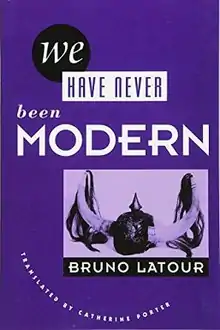We Have Never Been Modern
We Have Never Been Modern is a 1991 book by Bruno Latour, originally published in French as Nous n'avons jamais été modernes : Essai d'anthropologie symétrique (English translation: 1993).[1]
 | |
| Author | Bruno Latour |
|---|---|
| Original title | Nous n'avons jamais été modernes: Essai d'anthropologie symétrique |
| Translator | Catherine Porter |
| Country | France, United States |
| Language | English |
| Subjects | Science and technology studies, philosophy of science |
| Published |
|
| Pages | 157 |
| ISBN | 0-674-94838-6 |
| OCLC | 27894925 |
| LC Class | Q175.5.L3513 1993 |
| Preceded by | Science in Action |
| Followed by | Aramis, or the Love of Technology |
Content
The book is an "anthropology of science" that explores the dualistic distinction modernity makes between nature and society. Pre-modern peoples, argues Latour, made no such division. Contemporary matters of public concern such as global warming, the HIV/AIDS pandemic and emerging biotechnologies mix politics, science, popular and specialist discourse to such a degree that a tidy nature/culture dualism is no longer possible. This inconsistency has given rise to post-modern and anti-modern movements. Latour attempts to reconnect the social and natural worlds by arguing that the modernist distinction between nature and culture never existed. In other words it would be more useful to consider ourselves "amodern" or "nonmodern". He claims we must rework our thinking to conceive of a "Parliament of Things" wherein natural phenomena, social phenomena and the discourse about them are not seen as separate objects to be studied by specialists, but as hybrids made and scrutinized by the public interaction of people, things and concepts.[2][3]
Influence and Misrepresentation
Speculative Realist, Graham Harman points out that Latour has been misrepresented by some as a post-modernist. Harman cites We Have Never Been Modern as crucial to understanding Latour's conceptualisation of the "postmoderns as moderns a minus sign added" and therefore dismisses accusations of Latour as a postmodernist. Harman goes on to be influenced by We Have Never Been Modern adding that postmodernism continues to be subject-centric/anthropocentric (as modernity did) in its distinction of the subject from the object. This forms the basis for Harman's Object Oriented Ontology.[4]
See also
- Gilbert Durand's anthropological trajectory
References
- Latour, Bruno (1993). We have never been modern. Harvard University Press. p. iv. ISBN 978-0-674-94839-6.
- Latour, Bruno (1993). We have never been modern. Harvard University Press. pp. 142–145, back cover. ISBN 978-0-674-94839-6.
- Pickering, Andrew (1994). "We Have Never Been Modern (review)". Modernism/Modernity. 1 (3): 257–258. doi:10.1353/mod.1994.0044. ISSN 1080-6601. Retrieved 2010-08-10.
- Harman, Graham (2018). Speculative realism : an introduction. Cambridge, UK: Polity Press. p. 44. ISBN 978-1-5095-1998-9. OCLC 1019643398.